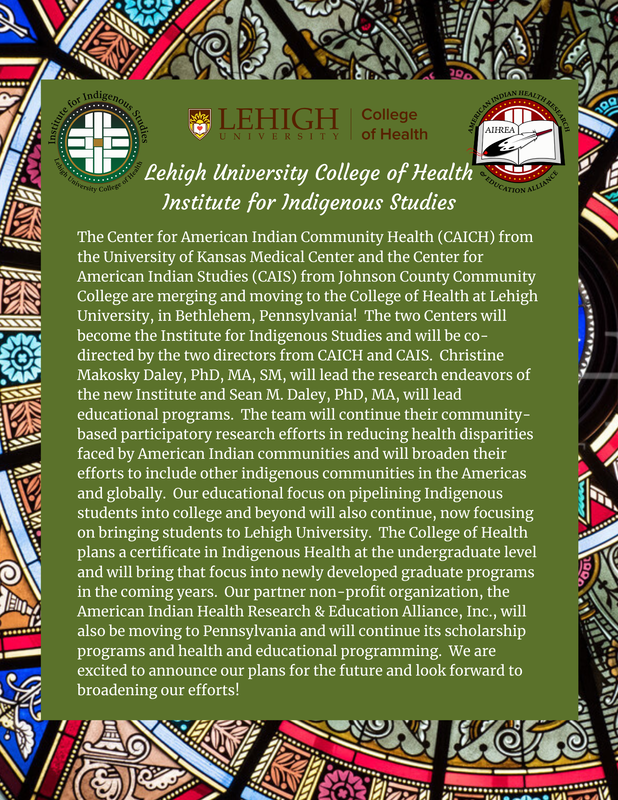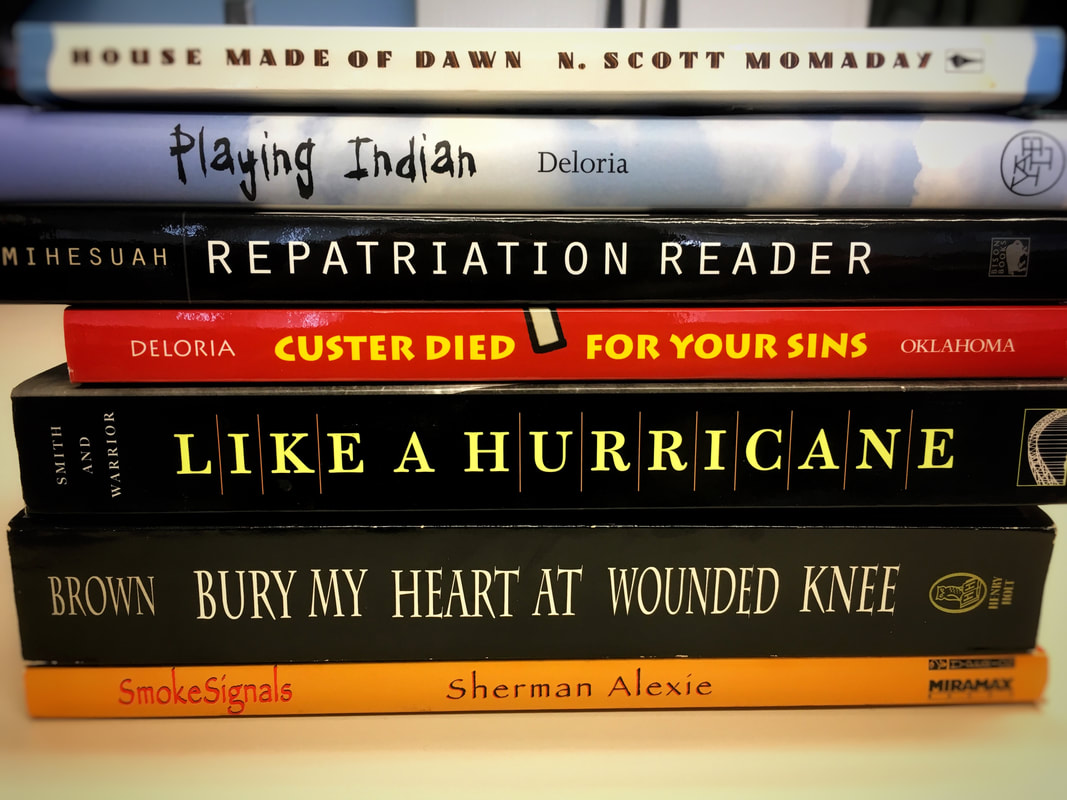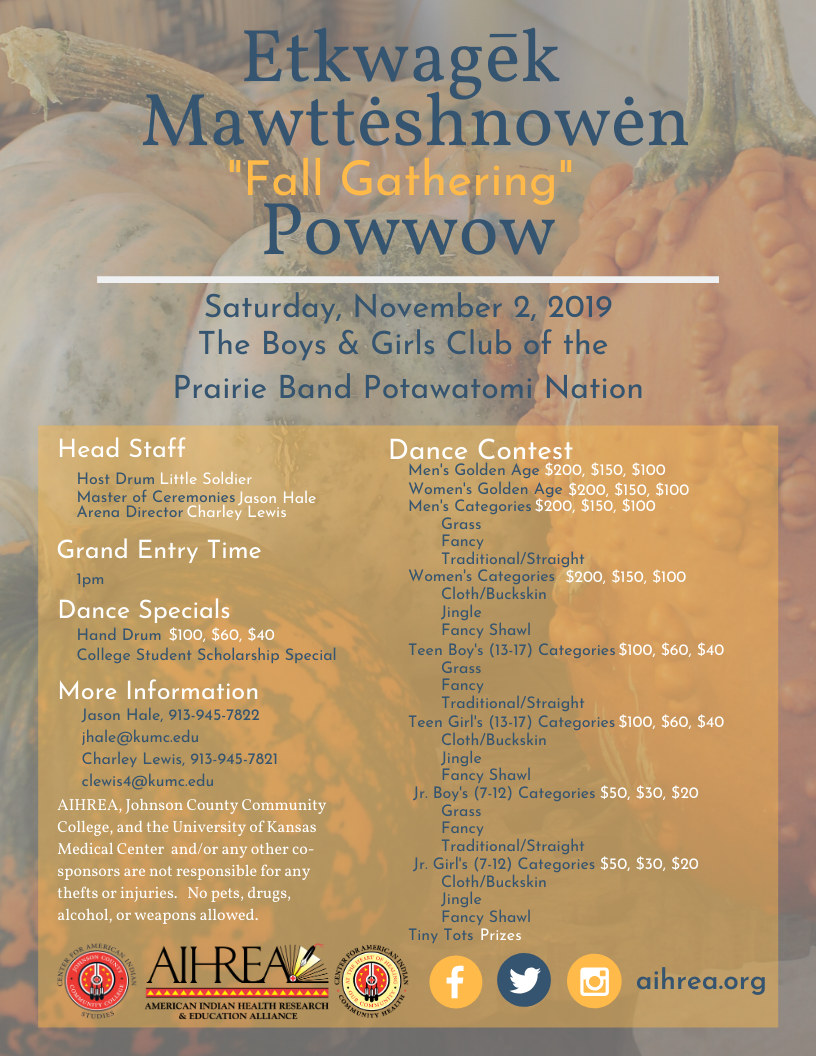|
Normally, we include a list of our graduates in our May powwow program. Due to the ongoing global pandemic and the resulting cancellation of this year's event, we were unable to do that. But, we would still like to congratulate our sole 2020 graduate, Christina Haswood! Congratulations, Christina! Read more about her and her work, plus a description of one of our new logos below!  I am Navajo and my clans are Tódích'íí'nii nishłí Dibé Łizhiní bashishchiin Naasht'ézhi Tábąąhá dashicheii Kinyaa'áanii dashinalí. I graduated with my Master of Public Health with a concentration in Management from the University of Kansas Medical Center this past spring. My capstone project was "Understanding the Knowledge, Attitudes, Beliefs, and Behaviors Surrounding Alternative Tobacco Use in American Indian College Students." This study consisted of running focus groups and surveys to Native college students who self-identified as being a current/former tobacco smokers, current/former alternative tobacco users, and never users. Native Americans have high smoking tobacco rates, but little research has been done on the prevalence of alternative tobacco smoking. The rise of younger adults and adolescents using electronic nicotine delivery systems (ENDS), such as vaping products like JUUL, is cause for concern about their use among Native youth. Our study found that current/former alternative tobacco smokers started to use ENDS because of peer influence and as a way to relieve stress. We found that majority of participants did not recall any ENDS prevention programs in their home communities. This suggests that there is a need for a culturally-tailored prevention program. During my time here at CAICH, I had the honor of working on a variety of projects from health screenings in Tribal communities to running focus groups. The support of Dr. Daley and the whole AIHREA team have helped me to become the first member of both sides of my family to earn a Master's degree. Institute for Indigenous Studies In addition to establishing the new institute and transitioning to Lehigh University, you may have noticed that the AIHREA logos got a little bit of a face lift thanks to Luke Swimmer enrolled member of the Eastern Band of Cherokee Indians, AIHREA member, and owner of Buffalotown Clothing Co. He also designed the new Institute's logo which has several symbolic meanings. The design in the center is a basket weave symbolizing the interconnectedness of all Indigenous peoples of the Americas – North, Central, and South. The main colors – green and gold – are earth tones, representing a connection to the Earth and good health. They also pair well with Lehigh University’s official colors – brown and white.
The gold rectangle in the center of the design represents the Institute for Indigenous Studies (IIS). It also represents the connection the IIS has to all the Indigenous communities with which it works. The larger gold circle around the main basket design symbols signifies family and community ties, as well as protection and understanding. The small dots on the outer edge of the design represent people and they are arranged in a larger circle symbolizing equality, where no one person is more important than another. We are excited for the new opportunities that this move has in store for us, our research, and the communities with which we work. To read a "Thank You" to the Northeast Kansas Native community for hosting us over the last 14 years, and other updates from 2019, check out our newest annual report which can be accessed below!
The current global pandemic, caused by COVID-19, throws into sharp relief the importance of access to accurate health information and what we can do to prevent COVID-19's spread and protect our families and communities. Given the disproportionate effects it is having on many Native communities, we have begun development of a series of Native-targeted brochures and posters for dissemination. With funding support from the Patient-Centered Outcomes Research Institute (PCORI) Engagement Award (14093-UOK), we will not only be printing them, but also having them translated into a number of Native languages from around the country! Brochures and posters cover a wide range of topics related to COVID-19, including how it spreads, prevention, symptoms, high risk populations, and pregnancy and breastfeeding. We have just finished designing the brochures and are happy to be making them available to you today! Check out the preview below, followed by free downloads of all the brochures!
AIHREA and our partners are all keeping a close eye on the development of the COVID-19 pandemic and its effects on the communities in which we live, work, and serve. This has taken on many different forms including delaying current research projects and re-evaluating future events. As such, it is with heavy hearts that we will be cancelling the 2020 AIHREA Our Nations' Energies Health and Wellness Powwow for the first time since its inception in 2007. We hope to see all of you happy and healthy at our future events after we come out on the other side of this pandemic! We've included a slideshow below of some of our favorite powwow memories over the years and would love for you to share yours! Share them with us on social media using the hashtag #AIHREAPowwowMemories! We recommend that you keep an eye on our social media pages because we hope to announce an event to celebrate the end of all the stay-at-home orders and social distancing this summer. Also, look for our 2019 Annual Report that will be available on June 1! Combatting COVID-19As the number of cases of COVID-19 continue to rise, we strongly encourage our followers to take every possible precaution to prevent the spread of this disease. There are currently 1,400 confirmed cases in the Indian Health Service System and communities continue to be hit hard by this pandemic. Indian Country Today's COVID-19 Syllabus is a great way to stay up-to-date with how COVID-19 is affecting Indian Country. The best way to prevent getting the illness is to avoid exposure. Here are five things you should do to make sure you and your family members don't get COVID-19.
For more information on COVID-19, what you can do to prevent its spread, and what to do if you think you, or someone you know, might be infected visit the Centers for Disease Control and Prevention's (CDC) COVID-19 information page. All of us here at AIHREA hope that this newsletter finds you well in the midst of the response to COVID-19. We would like to encourage all of our subscribers to take every possible precaution to limit the spread of this virus and protect themselves and their communities. For more information on what you can do to prevent COVID-19's spread, we encourage you to visit the Centers for Disease Control and Prevention's website here. In an effort to support your practice of social distancing, we've come up with a brief list of some of our teams favorite books by Native authors in honor of Read Across America Day held earlier this month. Keep scrolling to see some of our picks and check in on last March's newsletter if you'd like more recommendations! Race to the Sun |
Archives
July 2021
Categories
Never miss any of our monthly updates by entering your email below:
|
||||||||||||||||||||||||||||||
























 RSS Feed
RSS Feed